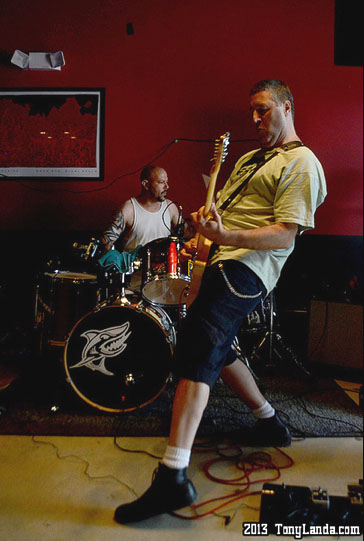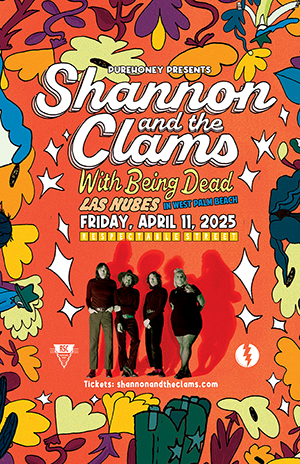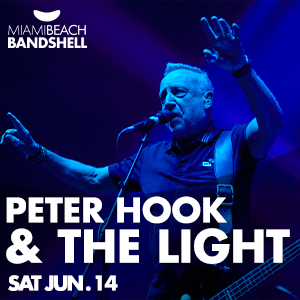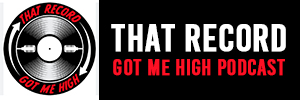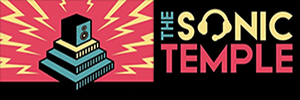From the Deaths of Two Legendary South Florida Punk Musicians, The Shark Valley Sisters are Born
The Shark Valley Sisters have reached the apex of their show.
It’s the final Friday night before the Native Florida Tap Room & Music Hall in Hollywood closes its doors forever, and the Sisters – singer/guitarist Rob Elba and drummer Fausto Figueredo – have launched into “The Prince & The Punk,” a mid-tempo, staccato, grinding punk ode to Dan Hosker and Bobby “Load” Johnston, two legendary South Florida musicians who died within a couple of months of each other last year.
“What’s in a name when the ash hits the ground?
What’s left behind if they don’t make a sound?
Who’s going to carry the flag when we’re dead?
The Prince and the Punk lay forgotten instead…”
The song cathartically lurches forward in stops and starts, while Elba fire-breathes the lyrics with his trademark scream-sing delivery. With every power chord and every bashing stick hit, there is a palpable release of emotion, as nearly a year of heartbreak is expressed in three minutes of punk fury.
“Telegraph tales of a wail and a roar
Passing down stories of what came before
Who’s going to carry the flame when we’re gone?
The Prince and the Punk – born to burn all along
Born. To. Burn…”
The song builds to its climax and explodes into the final consideration of whether it is better to live a short, extraordinary life or a long, conventional one. It is one of many soul-searching questions that each man has asked himself during the past year.
“Such is life for ordinary men
Curse the years and rue the days
Such is not for the Prince and the Punk
Not to be forgotten.”
So, while the Tap Room’s run is ending, the members of the Sisters are experiencing personal and musical rebirths.
Before delving any further into the raucous music of the recently established punk duo, the deaths of Hosker and Johnston must be addressed, because they are the only reasons that the Shark Valley Sisters exist. There’s no getting around it.
Elba and Figueredo were bandmates of Hosker and Johnston while ripping up the South Florida music scene in the 1990s as members of the unforgettable Miami punk bands, Holy Terrors and Load, respectively.
Hosker passed away last August at 46, months after a horrendous nighttime car accident on I-95, while Johnston, 42, died in October after a long battle with liver disease, the result of years of heavy drinking.
The deaths of the two admired and loved musicians were an awful one-two gut punch for family, friends and fans, and forced a generation of local musicians to confront its mortality, as neither was considered old and both died much too young.
Outside of family, nobody was closer to Hosker than Elba, and few people knew Johnston better than Figueredo. If their deaths were a shock for people who only tangentially knew them, for Elba and Figueredo they were seismic shifts and life changing events that no amount of condolences or memorials could assuage.
Only time lessens that kind of pain, quells the despair and dims the nagging thoughts of “what if?” There’s no getting around any of that, either. That’s how things work.
But once that happens, once life is no longer defined by death, then what?
What do you do?
THE LAST DAYS AND FINAL INSPIRATIONS OF MUSICAL BROTHERS
The Shark Valley Sisters story began at the after-funeral gathering in honor of Hosker at the now-defunct Tap Room.
Figueredo said he approached Elba and offered him the “opportunity to come to my home practice space and turn his amp up all the way to 1,000 and blow his fucking ears out.”
Figueredo also told him that in honor of Hosker, who played in scores of local musical acts during his career, he was going to start playing drums for a wide variety of bands. Neither Elba, nor Figueredo knew it at the time, but this decision set the wheels in motion for the Shark Valley Sisters and was the beginning of a musical and personal bromance.
“I told him that I was going to leave the door open and play with anyone who asked,” Figueredo, 42, said. “In just a couple of months I was playing in five bands. I had a different band practice every night during the week and gigs on most weekends. It was fucking insane.”
Meanwhile, Elba, 50, had fallen into the deepest depression of his life.
“It was horrible, just a horrible year,” Elba said. “I never had to deal with anything like that before, having somebody close to me die. My dad died of cancer 12 years ago, but it wasn’t the same. I didn’t realize just how close I was to Dan, how important he was to me and how much of a brother he was.”
The native of Queens, New York said the weeks following Hosker’s accident were filled with brief moments of hope for his survival, followed by long phases of despair about the reality of his chances. The ordeal took a heavy emotional toll on everybody who was closely involved.
“In the end, they finally realized that he just wasn’t there anymore,” Elba said. “After he died, I was seriously depressed for a long time.”
Although Elba received many offers from guitar players who wanted to try to plug into Hosker’s Holy Terrors role – some, amazingly, while he was still on life-support – there was simply no way he was going to continue the band.
“I resigned myself pretty quickly to not doing the Holy Terrors anymore,” he said. “I really didn’t think I’d ever be in a band again.”
In the months after Hosker’s wake, Figueredo kept his word and played with several bands, including straight-ahead punkers, Flees, classic punk outfit, UFC, and Good Shepherd, a ska band.
It was about that time that Figueredo’s good friend and former Load bandmate, Bobby “Load” Johnston, lost his years-long battle with liver disease, passing away quietly on an early mid-October morning.
“I was at work when I got the call from Bobby’s brother Jeff,” Figueredo said. “Bobby had been on a downward spiral for a long time and at the end he was in really bad shape. We always knew the day would come, but it was still really hard. Bob was a big part of my life. He changed my view of music. Most importantly, he was a good friend.”
Figeuredo said he spent many hours with his friend during his final days.
“There were long periods of time when he would be completely out and I would sit there in his room and reflect on our life together, all the shit we did, the band, the shows. It hit me really hard,” he said. “Bobby had a tough life and was in a lot of agony at the end. I don’t want to say it was a relief when he died, but it was better that his pain was over.”
Figueredo said he thought a lot about the seven American tours Load experienced by van and how fortunate he was “to get to sit behind the best frontman in the history of the South Florida music scene.”
“It was amazing to get to see the way people reacted to him onstage and how he could win over any music scene anywhere in the country in a matter of hours,” he said. “And he did it every single night.”
Elba also spent quite a bit of time with Johnston at the end and did something he couldn’t bring himself to do while Hosker was being kept alive by a respirator.
“People kept telling me that I should talk to Dan when he was in a coma because he could hear me,” Elba said. “I found that hard to accept and wasn’t comfortable doing it. At one point, [former Goods lead singer and current solo artist] Jim Camacho visited Dan, and played for him. He asked what he should play and we told him Dan was a big fan of Tom Waits, so he played ‘Downtown Train’ for him. That wasn’t something I could do.”
Months later, Elba found himself alone in a hospital room with a barely-conscious Johnston and an acoustic guitar that had been left for musicians to play for the dying singer.
“I picked up the guitar and played ‘The Black Rider’ by Tom Waits and ‘Going, Going Gone’ by Dylan, which we ended up playing at Dan’s memorial show,” Elba said. “He wasn’t really there. He’d moan once in awhile like somebody who was having a bad dream. There was an odd sense of déjà vu. It was sad, but it was a different kind of sad than with Dan. It’s a powerful thing to be in that situation with somebody you’ve known for such a long time.”
When Johnston finally succumbed to liver disease, Figueredo resolved to continue with the musical mission he undertook after Hosker died.
“I decided that I wasn’t gonna take a break or slow down,” he said. “Bobby and Dan never did, they played all the time, they never stopped, so I was going to keep going.”
MERGING MUSICAL PATHS LEAD TO A CRUCIAL DRUNK TEXT MESSAGE
One night, Elba caught Figueredo’s ska band, Good Shepherd, in Fort Lauderdale at The Monterey Club and was surprised by what he heard Figueredo play.
“It kind of changed my perception of what he was capable of,” Elba said. “I was also impressed that he was following through with his ‘play-with-anyone-in-honor-of-Dan’ plan. Later, I also caught him with Flees, and it was clear he was showing his versatility.”
These were key moments for two legendary musicians who were part of the same scene for decades, but never played together.
When original Holy Terrors drummer Sam Fogarino left South Florida for New York City in 1996 (and eventually became the drummer for Interpol), the band employed some of the best punk rock and rock drummers South Florida has produced, including Chris “Spikey” Goldbach (Collapsing Lungs, Radiobaghdad); Blake Eden (Basketcase), Mike Bocsusis (One) and Ricky Pollo (Kreamy Lectric Santa).
Conspicuously absent from that list was Figueredo, who for years questioned why Elba never tapped him to bash the skins for the Terrors. After awhile, it became a running joke between them.
“I was like, hey man, everybody gets a shot to play with the Terrors, except me. What the fuck?!” said Figueredo.
For Elba, it was a matter of style and fit.
“Load was the only band we felt could blow us off the stage. We didn’t feel that way about anybody else and obviously Fausto was a huge reason why,” Elba said. “The truth is while I was huge fan of Load, I was never a big fan of Fausto’s style of drumming. It wasn’t that I didn’t think he was a good player. I just didn’t think he was the right fit for the Terrors.”
It is not entirely surprising Elba felt that way. Figueredo is a decidedly unconventional drummer.
Heavily influenced by Bill Stevenson of the Descendents, George Hurley of the Minutemen and Bill Ward of Black Sabbath, his drumming is muscular, inelegant and often circuitous, and was a big reason why Load was so much more than a straight-ahead punk band, with its forays into hard rock, metal, thrash, drone-core, dirge and experimental trippy sludge.
Figueredo plays with a self-taught, “goofy foot,” drumming style. From the waist down – kick drum, high hat pedal – he plays like a conventional right-handed drummer. From the waist up, he hits the drums and cymbals left handed, with an open-handed, over-the-head style that allows him to “swing and pound,” sometimes appearing as if he’s playing in several directions simultaneously.
It’s a style that Figueredo developed with Load because their late frontman, Johnston, would go through periods where he was too drunk to give his best performance and the other players would work to pick up the slack.
“It started as a showmanship kind of thing to keep the crowd into the show when Bobby wasn’t at his best,” Figueredo said. “It developed into a style and technique that keeps my upper body wide open and gives me a lot of freedom to hit toms, floor toms and cymbals in different kinds of ways.”
In his post-Load career, Figueredo has played many styles of music, including tribal rhythms, rock, reggae and ska. But when it comes down to it, he always returns to his roots.
“I know what I am,” he said. “I’m a heavy, punk rock drummer.”
Conversely, Elba’s relentless Johnny Ramone-inspired guitar work is rapier, angular, mathematical and linear. That style made him the perfect musical complement for Hosker’s experimental, serpentine and melodic excursions. When their guitar picks ripped across strings and their amps wailed, they were guitar kin, linked so tightly, it often sounded like one player.
Elba’s precise, occasionally talk-sing, vocal phrasing follows a similar stylistic path, and includes his trademark scream. “I never fashioned myself as a singer, but my voice has a presence,” he said. “The screaming is totally in my wheelhouse and it’s effective.”
Elba never took Figueredo up on his offer to jam his way out of his depression. Instead, he fell back on the stability of his 28-year marriage to his wife Elisa and his online jewelry business.
So it came as a pretty big surprise when Figueredo received a late night, drunk-text from Elba saying the time had come for them to play together.
“It was a little incoherent,” Figueredo said. “I really didn’t know what to make of it.”
By the next day, Elba had forgotten that he had sent the text. An afternoon phone call from Figueredo jogged his memory.
“He called to ask me if I was serious, and I wasn’t serious,” Elba said. “But we decided to get together anyway to jam to see if there was anything there.”
Turns out, there was.
THE DUO DYNAMIC OF A DYNAMIC DUO
Both Elba and Figueredo are considered South Florida musical royalty. It’s oddly funny that a couple of iconoclastic punk rockers could wind up attaining iconic status, but such are the vicissitudes of cranking guitar amps up way past 11 and bashing drum sets to pieces.
For musicians who have exclusively played in bands, especially in volatile young bands full of intense personalities and outsized egos, the duo dynamic is liberating.
From a logistical standpoint, everything is easier. There is only one other person who needs to be called, accounted for and agreed with. Every decision is a unanimous vote.
This is especially true regarding the creation and playing of music. For the right two musicians, a duo presents a wide-open creative palette and an opportunity to sound tight almost immediately. For a punk rock duo comprised of a guitarist/vocalist and a drummer, the challenge is to cover the frequencies and rhythms normally played by a bassist.
Because Elba and Figueredo are resolute about not including a third member, each bears some of the additional sonic responsibilities. This has pushed them in musical directions neither has explored in the past.
For Elba, that has included adding effects pedals and incorporating slide guitar work into his repertoire. He is also occasionally playing through a bass amp that was once used by Hosker. For Figueredo, that has meant that he is focusing more on his kick drum and playing in odd time signatures.
They are also experimenting with musical styles and techniques that would shock fans of both Holy Terrors and Load. These include techno rhythms, beatboxing and old-school rap.
“I am slowly working toward singing and playing differently than I ever have,” Elba said. “I’m interested in anything and everything, as long as it is authentic.”
THE END OF A LEGENDARY CASE OF WRITER’S BLOCK
Since starting in early April, the duo has written nine songs. On the surface, that might sound mundane, but when you consider that for 17 years, Elba, one of the best songwriters in South Florida music history, had writer’s block, the spate of new songs is close to miraculous.
From the end of the Holy Terrors as an ongoing, original band in 1996, to the sessions that created 2009’s “Hearing Damage: Songs Inspired by the Life and Noise of Rat Bastard” (a.k.a. the Rat Opera), Elba wrote a grand total of five songs. (Those were penned for the 2004 release, “This Is What It Sounds Like When You’re Dead.”)
Elba said that the songs for the Rat Opera – a tribute to long time Miami producer Frank “Rat Bastard” Falestra – helped move him closer to the end of his writer’s block, but they were not songs of personal expression.
“I love Rat, and the Rat Opera was a lot of fun, but all the songs were about him,” he said. “It’s hard to count them as songs that ended the block.”
Besides, four years passed before he wrote another song.
“It was a running joke between me and Dan for years. He’d call me up to ask if I had written anything, knowing that I hadn’t,” Elba said. “With the Terrors, I felt like I had been in the best possible band and that was the only thing I ever wanted to do. I’d halfheartedly try to write new stuff, but I didn’t have anything to write for anymore.”
Shark Valley Sisters is only the third original band Elba has been in and his first without Hosker. Figueredo, meanwhile, has played in several bands, most notably being a five-year stint in Tongues of the Heartworm, from 2006-2011.
But from the moment the two began to play at Figueredo’s home practice space, Elba’s blockage cleared and music flooded out.
“When we came together the first time it clicked,” Figueredo said. “The second time we came together, it really clicked. The Sisters is a perfect storm of both of our styles, and it gets better every time we play.”
The duo immediately knocked out a batch of new songs, which they will play live only in short 20-30 minute sets.
“Playing with Fausto gave me the spark I had been missing, and I really feel like we are only scratching the surface,” Elba said. “It isn’t something that I will ever take for granted again.”
Elba was in his late 20s when he last wrote songs. They vibrated with a pissed-off, youthful swagger and dissatisfied worldview. They were literate, Lou Reed-influenced character studies, mini-jeremiads and elliptical morality plays presented in fragmented bursts that required the listener to fill the blank spaces with personal experience.
Now, as a 50-year-old, his point of view has shifted to issues of middle age. He has experienced loss. His kids have grown up. There have been successes and failures.
Life doesn’t hold quite the same mystery anymore, but that has been replaced by a more grounded understanding about how things work.
“A lot has happened since I last wrote,” he said. “I’m definitely writing from an older, more mature point of view.”
Perhaps a function of maturity, the lyrical language in the new songs is far more direct. This plays out most clearly on “Plans,” in which Elba casts a sardonic eye on younger generations.
“I know it’s fabulous
To count yourself among the beguiled
It’s the consensus that
This feeling’s gonna last for awhile
But darker skies are gathering, I fear
It’s a sad surprise to find
The thunder that you’re hearing
Is the sound of God laughing at your plans…”
As for their plans for Shark Valley Sisters, Elba and Figueredo are scheduled to enter Rat Bastard’s Miami recording studio, The Laundry Room, in mid-August to work on their debut release.
Beyond that, the Sisters want to continue to develop material, play locally as much as possible and enjoy their budding friendship.
“I love playing with Fausto,” Elba said. “It is a lot of fun writing with him. He’s totally into it and listens. He comes up with a lot of cool ideas and has excellent instincts. He pushes me to look at things differently. He’s also a great friend.”
Both agree rock star dreams of the past are no longer a priority.
“At this point, if you were going to make money in the music business, you would have a long time ago,” Figueredo said. “Most musicians our age are either bitter that it didn’t happen for them or want to play because they love doing it. I really love playing with Rob and we are both inspiring each other. It feels wide open and we can do anything we want. Most importantly, our friendship comes first.”
There’s no better tribute to the memories of Dan Hosker and Bobby “Load” Johnston than that.
~ Adam Matza
Photos Tony Landa | DigUnderRock.com
View photos of Shark Valley Sisters by Tony Landa at DigUnderRock.com
Reprinted courtesy of Adam Matza Copyright 2013 and DigUnderRock.com
![]()

